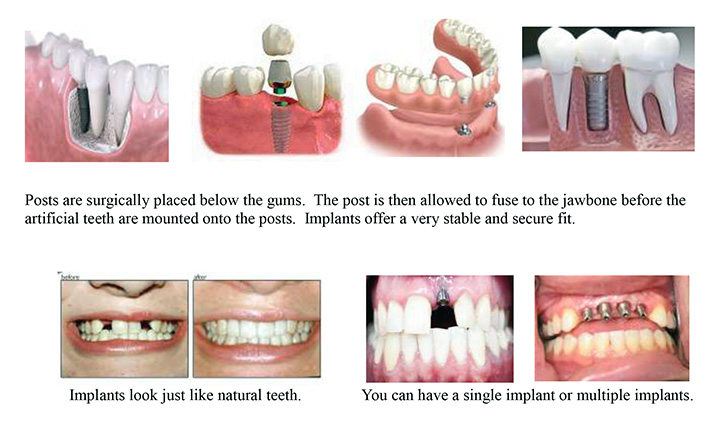Arlington Dental Center’s Dr. Bradberry does Dental Implants
What are Dental Implants?
Dental implants are metal posts or frames that are surgically positioned into the jawbone beneath your gums. Once in place, they allow your dentist to mount replacement teeth onto them.
How do Dental Implants Work?
Because implants fuse to your jawbone, they provide stable support for artificial teeth. Dentures and bridges mounted to implants won’t slip or shift in your mouth — an especially important benefit when eating and speaking. This secure fit helps the dentures and bridges — as well as individual crowns placed over implants — feel more natural than conventional bridges or dentures.
For some people, ordinary bridges and dentures are simply not comfortable or even possible, due to sore spots, poor ridges or gagging. In addition, ordinary bridges must be attached to teeth on either side of the space left by the missing tooth. An advantage of implants is that no adjacent teeth need to be prepared or ground down to hold your new replacement tooth/teeth in place.
To receive implants, you need to have healthy gums and adequate bone to support the implant. You must also commit to keeping these structures healthy. Meticulous oral hygiene and regular dental visits are critical to the long-term success of dental implants.
Implants are usually more expensive than other methods of tooth replacement, and most insurance carriers typically cover less than 10 percent of the fees. But implants are such a drastic improvement over older methods of dental repair that they are well worth the money.
Arlington Dental Center’s Dr. Tim Bradberry will do your implants for the lowest possible price. Call 743-3114 for an appointment.
Oral Care Tips for IMPLANTS
Most dental implants are successful, but there are also steps you can take to help ensure success, and to make your implant last.
- Practice good oral hygiene – brush twice a day and floss once daily. Using interdental brushes, brushes that slide between teeth, can help clean the hard to reach areas around your implant.
- Quit smoking – smoking can weaken the bone structure and can contribute to implant failure. Researchers in Spain studied 66 patients who received 165 implants and followed their progress for 5 years. The implant failure rate for smokers was 15.8 percent, compared to just 1.4 percent for nonsmokers.
- Visit your dentist – cleanings and exams every six months can help ensure your implant is in good condition, and that it stays that way.
- Avoid chewing on hard foods – don’t chew on hard items such as ice and hard candy because they can break the crown on the implant, as well as your natural teeth.

